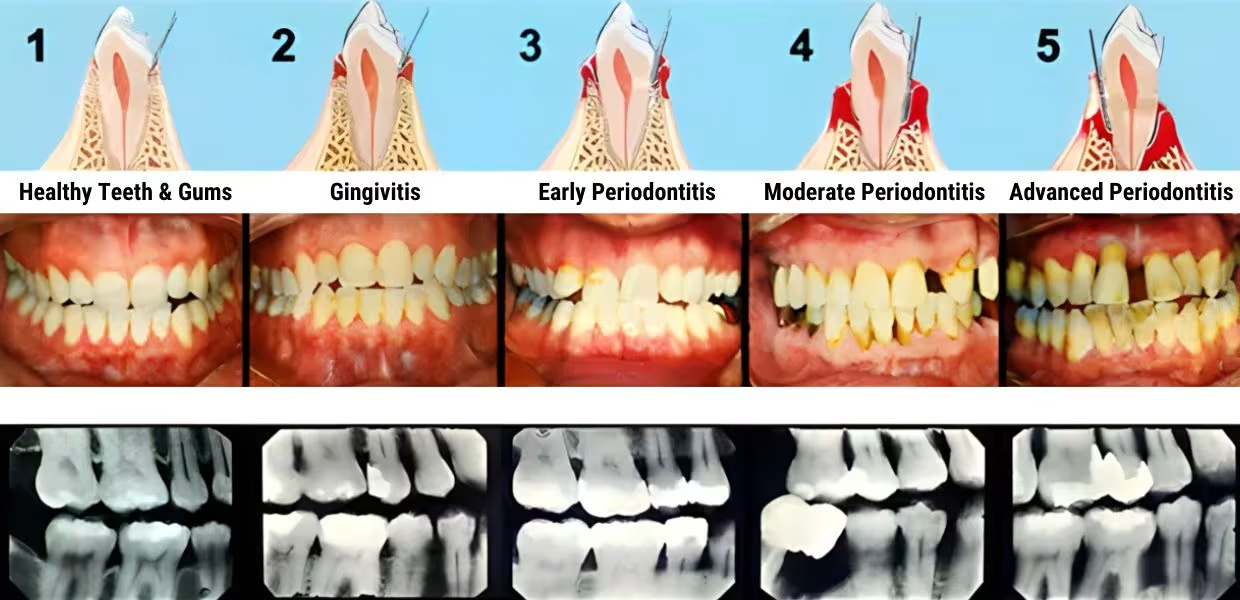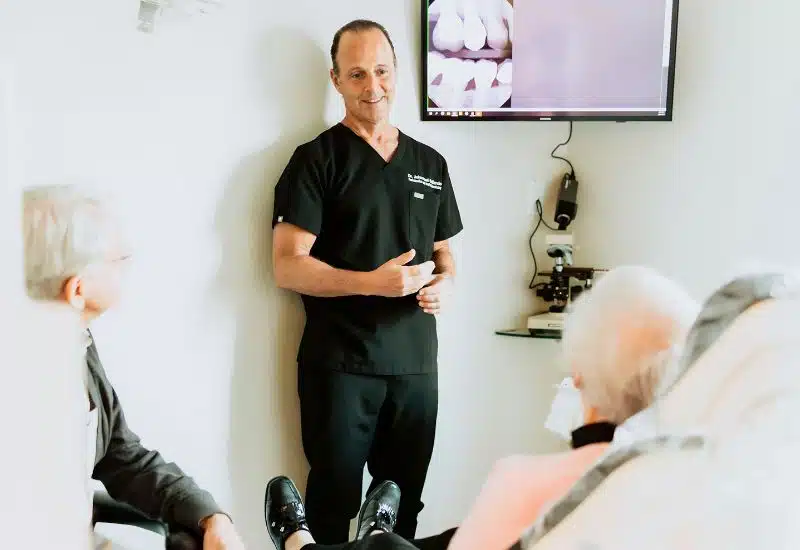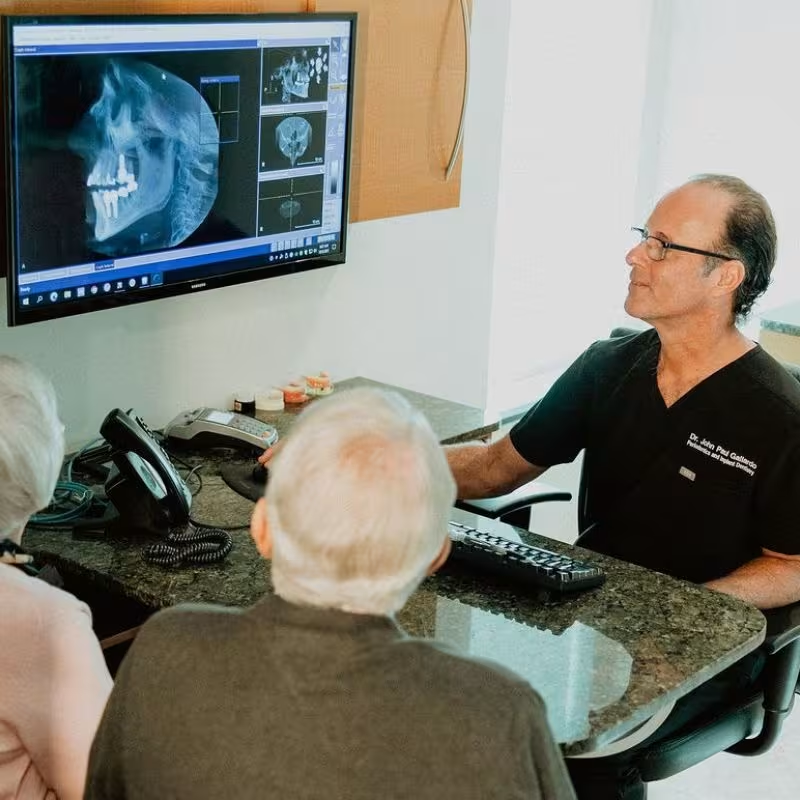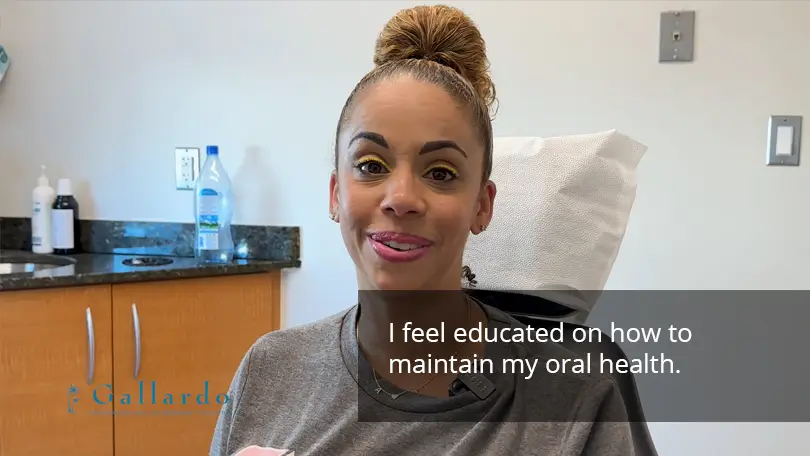Home / Dental Services / Non-Surgical Treatments
Non-surgical Gum Disease Treatment in Miami, FL
Control Gum Disease Early, Without The Need For Surgery
- Gentle and Convenient: Non-surgical gum treatment is designed to be comfortable with minimal recovery time, quickly and pain-free.
- Cost-Effective Gum Care: Affordable treatment for gum disease that avoids the cost and complexity of surgery.
- Prevent Future Expensive Treatments: Address gum disease now with non-surgical options to avoid more complex procedures.
- No Surgery, Just Results: Enjoy healthier gums without the fear or recovery time of surgery. It’s simple and effective.
- 30+ Years of Trusted Care: Dr. Gallardo’s decades of experience mean effective, non-surgical gum treatment you can trust—personalized care, real results.
What is Non-Surgical Gum Disease Treatment?
If you suffer from periodontitis, then you should consider using non-surgical periodontal therapy to treat your condition without causing any damage to your mouth.
Many times, the early stages of periodontal disease are best treated with non-surgical periodontal therapy. This usually consists of placing a fine ultrasonic cleaning tip in between the tooth and gum tissue to remove any plaque and calculus below the gum line. This procedure is performed during root planing. In less advanced cases, shrinking these infected gum pockets can eliminate diseased sites.
Then the patient can personally maintain these areas with routine brushing and flossing. Some causes of gum disease include poor oral hygiene, smoking, teeth grinding, certain medications, pregnancy, and genetics. Early intervention is necessary to reverse gum disease for both gum health and overall health.

Early Signs of Gum Disease (Gingivitis)
- Do you have bleeding gums?
- Do you have deep gum pockets?
- Do you have bad breath?
- Are you experiencing any pain when chewing?
- Have past gum treatments not worked well?
Answering yes to any of these questions may mean you are suffering from a gum infection. Without proper treatment, gum disease can affect your dental health and the health of your entire body, and it can increase your risk of heart disease, stroke, and diabetes. The only way to determine if you are dealing with periodontitis is to see a specialized periodontist.
At our practice, even in the most severe cases of periodontal disease, non-surgical periodontal therapy most often precedes surgical therapy.
Stop Gum Disease Before It Gets Worse
At Gallardo Periodontics non-surgical treatments are gentle, with minimal discomfort and a fast recovery.
Warning Signs of Advanced Gum Disease (Periodontitis)
- Painful or sensitive teeth, especially when chewing.
- Teeth that feel loose or start shifting.
- Swollen, puffy, or tender gums.
- Gums that recede from your teeth, bleed easily, or appear very red or purplish.
- Pus around your gums or teeth.
- Changes in how your teeth fit together
In the most advanced cases, gum disease can lead to tooth loss. Bacteria from your gums can even enter your bloodstream and affect other parts of your body, including your heart. If you notice any of these symptoms, it’s important to reach out to Dr. Gallardo. With the right treatment, we can help stop the disease and keep your smile healthy.
How to Keep Gingivitis from Turning into Periodontitis?
Dr. Gallardo can help prevent gingivitis from turning into periodontitis with good habits, professional cleanings, and antibiotic therapy. At Gallardo Periodontics, we’ll choose the best treatment for you, guide you through it, and keep your gingivitis in check.
How Is Gum Disease Treated?
NON-SURGICAL GUM TREATMENTS IN MIAMI

Gum disease, also known as periodontitis, can affect people in different ways, and treatment depends on the type and stage of the disease. Dr. Gallardo will begin by using digital x-rays and a thorough examination to assess the condition of your gums. Based on these findings, Dr. Gallardo will recommend the best treatment options to help restore and protect your oral health.
Some cases may benefit from modular periodontal therapy, a non-surgical method that’s effective for diagnosing, treating, and preventing gum disease. Here’s what you need to know about the different types of periodontitis and their treatments:
Aggressive Periodontitis
Aggressive periodontitis is a rare but fast-moving form of gum disease, often affecting young adults and even children. If left untreated, it can lead to quick bone and tooth loss. Treatment for aggressive periodontitis focuses on slowing down the disease’s progression and saving as much gum and bone tissue as possible. Options may include deep cleaning methods, medications, and lifestyle changes to support gum health.
Chronic Periodontitis
Chronic periodontitis is the most common form of gum disease, usually developing slowly over time due to plaque buildup. Treatment for chronic periodontitis may involve regular cleanings, medications, and possibly modular periodontal therapy to manage and slow the progression. By consistently removing plaque and addressing any underlying causes, this treatment can help prevent further damage, including tooth and bone loss.
Necrotizing Periodontal Disease
Necrotizing periodontal disease is a severe form of gum disease that impacts the blood supply to the gums, affecting the tissues and bones that support teeth. People with weakened immune systems—such as those with HIV, cancer, or malnutrition—are most at risk. Treatment for this type of periodontal disease may include specialized deep cleanings, medications to address infection, and guidance on nutrition and lifestyle factors that can support recovery.

Stop Periodontal Disease Early
contact dr. Gallardo
If you are concerned about the health of your gums, or are noticing signs of gingivitis or periodontitis, contact our office to schedule a consultation. Call our Miami dental office at 305.447.1447 for more information. With the help of Modular Periodontal Therapy, Dr. Gallardo can restore a healthy mouth and gums.
Treating Periodontitis with Modular Periodontal Therapy
Modular Periodontal Therapy (MPT) is a minimally invasive, non-surgical treatment designed to effectively manage and reverse gum disease. MPT combines various periodontal treatments to remove plaque and tartar from beneath the gums, eliminating harmful bacteria and irritants that contribute to periodontitis.
By targeting the root cause of gum disease, MPT helps prevent future plaque buildup, allowing patients to avoid more invasive procedures like flap surgery or grafts.
Cleaning
Scaling and polishing are included in routine dental cleaning at the dentist's office, although these may not be enough to treat periodontitis. Root planing refers to a deep cleaning process that gets under the gum line, where bacteria can build. The debridement process is vital for an effective gum disease treatment plan.
Irrigation
Irrigation pulses a jet of high-pressure water through a small handheld device, rinsing plaque and tartar away from the surface of the teeth and along the gum line. You can do irrigation for gum disease at home with tools such as Water Pik or Hydro Floss. Additionally, routine irrigation performed by a periodontist will use professional-grade devices and medicated solutions to ensure maximum control of gum disease.
Antibiotics
Treatment with antibiotics is an important step for patients suffering from advanced gum disease. Antibiotics for gum disease, which may include amoxicillin or metronidazole, can successfully eliminate infection below the gum line, allowing the mouth to heal. Our experienced professionals will determine the best course of action and prescribe any medications, as well as develop a proper treatment plan for you.
Deep Cleaning: Scaling
Healthy gums have pockets under 3 mm, while pockets over 4 mm indicate gum disease, as the gum begins pulling away from the tooth. To treat this, a dentist or specialist like Dr. Gallardo will perform a deep cleaning to remove plaque and tartar below the gum line. This process, called scaling, involves using either a manual tool or an ultrasonic scaler that vibrates to break up tartar, followed by a final clean with a handheld scraper.
Root Planing
Non-surgical treatment for gum disease also typically involves root planing. The goal of root planing is twofold. (1) It removes tartar and bacterial toxins from the root’s surface, leaving a smooth area. (2) When the root surface is smoothed, it’s more difficult for tartar to build up and for bacteria to collect there. After planing, the gums have a good chance of healing and reconnecting to the tooth, helping reduce the size of the pockets and reverse the course of the disease.
Supportive Periodontal Therapy
HEALTH BENEFIT TO OUR PATIENTS
For periodontal procedures to be successful in the long term and to lessen the dangers of complications, we strongly advise our patients to schedule supportive periodontal therapy appointments. Beyond just removing stains and calculus that have formed on your teeth, Dr. Gallardo will spend careful attention evaluating your teeth to determine if your periodontal disease is in remission or if the disease may be progressing. If there are any signs of progression, he will remove the bacteria from below your gum line before irreversible bone loss occurs. Early detection allows a more conservative and cost-saving approach to treating any changes in your periodontal disease. Also, as a health benefit to our patients, we perform an oral cancer screening at each supportive periodontal treatment appointment.
The American Academy of Periodontology recommends that patients with periodontal disease have supportive periodontal treatment appointments every three to four months. Adherence to this recommendation has proven, through years of clinical research, to be the one overwhelming factor that influences whether patients will keep their teeth. Please call today to schedule an appointment with one of our experienced, friendly, and professional dental hygienists.
What Our Patients Say
Committed to your results

Treatment for Advanced Periodontitis
If your periodontitis is more advanced, surgical intervention might be needed. Your dentist may discuss several options with you, including:
- Soft tissue grafts: Soft tissue grafts are placed to reinforce soft tissues that have been lost due to gum recession. Your surgeon may harvest the grafts from your body or use donor tissue.
- Flap surgery: Flap surgery is a periodontal surgery procedure that allows for intensive root planing and scaling.
- Guided tissue regeneration: Guided tissue regeneration is done to initiate bone regrowth. It uses biocompatible fabric to provide structure and support.
- Bone grafting: If the bone around a tooth root is destroyed, bone grafting may be considered. It uses fragments of your bone or donor bone to reconstruct the jaw. The purpose is to keep your tooth in place so that you do not lose it.
- Laser therapy: A minimally invasive alternative to traditional surgery that uses a dental laser to remove diseased tissue and bacteria.
- Tissue-stimulating proteins: Using tissue-stimulating proteins, healthy tissue, and bone growth are stimulated using a special gel.
The Importance of Early Treatment for Gum Disease
The earliest the best to treat and reverse gum disease. If you suspect you may have gum disease or other dental issues, don’t hesitate to call Gallardo Periodontics and Implant Dentistry at 305-547-8687 or click here to schedule a consultation. Dr. Gallardo and the rest of our team look forward to providing you with the dental care and treatments you need to enjoy a beautiful, healthy smile!


Why Choose Dr. Gallardo for Your Non-surgical Gum Disease Treatment
Dr. John Paul Gallardo, DDS, PA, is a leading periodontist and implant expert in South Florida. Here is why you should choose Dr. Gallardo for your non-surgical gum disease treatment:
- Dr. Gallardo has 30 years of experience offering dental implants and specialized periodontics to patients throughout South Florida.
- He is a graduate of the University of Miami and received his Doctor of Dental Surgery degree from New York University College of Dentistry.
- Accepted into the V.A. Medical Center General Practice Residency Program of the U.S Department of Veterans Affairs where he was honored with the “Outstanding Resident of the Year” Award.
- Dr. Gallardo has lectured nationally and internationally to dentists and hygienists and has been sponsored by companies such as Procter and Gamble to speak on clinical topics related to gum disease and implant dentistry.
- Dr. Gallardo remains a leader in periodontics and implant dentistry through his active and past involvement with University of Florida, Florida Association of Periodontists and North American Society of Periodontists.
Frequently Asked Questions
Can periodontitis be cured without surgery?
Yes, periodontitis can be cured without surgery in some cases. Non-surgical treatments such as root planing and scaling, tissue-stimulating proteins, and supportive periodontal therapy can help reduce the symptoms of periodontitis and prevent it from progressing. However, if the disease is more advanced, surgical methods may be necessary.
What is the difference between gingivitis and periodontitis?
Gingivitis and Periodontitis are related but not the same. Gingivitis is the early stage of gum disease, marked by red, swollen gums that may bleed easily due to plaque buildup. With good oral hygiene, it can often be reversed. Periodontitis is the advanced stage, where gums pull away from the teeth, forming pockets that trap bacteria and cause infections. This stage can lead to pain, tooth alignment issues, and even tooth loss if untreated.
What is non-surgical treatment for periodontitis?
Non-surgical treatment for periodontitis can help reduce the symptoms of gum disease and prevent it from progressing, including loose teeth. Root planing and scaling are common non-surgical treatments that involve using specialized instruments to remove plaque and tartar buildup below the gum line. Tissue-stimulating proteins can also stimulate healthy tissue and bone growth. Additionally, supportive periodontal therapy appointments every three to four months may help keep the disease in remission.
Can periodontitis gum disease be cured?
Yes, periodontitis can be cured with proper treatment such as root planing and scaling, tissue-stimulating proteins, and supportive periodontal therapy to reduce periodontal pockets.
Does periodontitis stay forever?
No, periodontitis does not stay forever. With proper treatment and care, it can be treated and kept in remission. However, without treatment, periodontitis is likely to progress and can eventually lead to more serious issues such as tooth loss.
Can you stop periodontitis at home?
No, periodontitis cannot be stopped at home. It is a serious condition that requires professional treatment to reduce the symptoms and prevent it from progressing further. At-home care such as diligent brushing and flossing can help to keep the disease in remission, but professional intervention is necessary to successfully treat it.
What Non-Surgical Treatments office is near me?
If you live near Miami, FL, Gallardo Periodontics and Implant Dentistry offers non-surgical treatments among its services, and is conveniently located at 2020 SW 27th Ave Miami, FL 33145